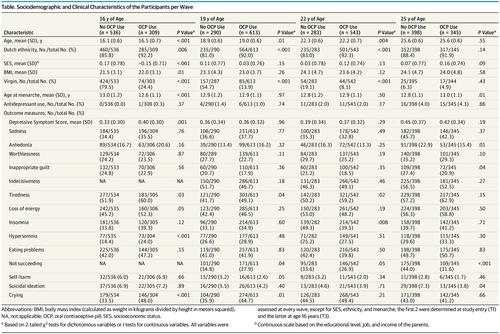JAMA Psychiatry ( IF 25.8 ) Pub Date : 2020-01-01 , DOI: 10.1001/jamapsychiatry.2019.2838 Anouk E de Wit 1, 2 , Sanne H Booij 1 , Erik J Giltay 3 , Hadine Joffe 2, 4 , Robert A Schoevers 1 , Albertine J Oldehinkel 1

|
Importance Oral contraceptives have been associated with an increased risk of subsequent clinical depression in adolescents. However, the association of oral contraceptive use with concurrent depressive symptoms remains unclear.
Objectives To investigate the association between oral contraceptive use and depressive symptoms and to examine whether this association is affected by age and which specific symptoms are associated with oral contraceptive use.
Design, Setting, and Participants Data from the third to sixth wave of the prospective cohort study Tracking Adolescents’ Individual Lives Survey (TRAILS), conducted from September 1, 2005, to December 31, 2016, among females aged 16 to 25 years who had filled out at least 1 and up to 4 assessments of oral contraceptive use, were used. Data analysis was performed from March 1, 2017, to May 31, 2019.
Exposure Oral contraceptive use at 16, 19, 22, and 25 years of age.
Main Outcomes and Measures Depressive symptoms were assessed by the DSM-IV–oriented affective problems scale of the Youth (aged 16 years) and Adult Self-Report (aged 19, 22, and 25 years).
Results Data from a total of 1010 girls (743-903 girls, depending on the wave) were analyzed (mean [SD] age at the first assessment of oral contraceptive use, 16.3 [0.7]; (mean [SD] age at the final assessment of oral contraceptive use, 25.6 [0.6] years). Oral contraceptive users particularly differed from nonusers at age 16 years, with nonusers having a higher mean (SD) socioeconomic status (0.17 [0.78] vs –0.15 [0.71]) and more often being virgins (424 of 533 [79.5%] vs 74 of 303 [24.4%]). Although all users combined (mean [SD] ages, 16.3 [0.7] to 25.6 [0.6] years) did not show higher depressive symptom scores compared with nonusers, adolescent users (mean [SD] age, 16.5 [0.7] years) reported higher depressive symptom scores compared with their nonusing counterparts (mean [SD] age, 16.1 [0.6] years) (mean [SD] score, 0.40 [0.30] vs 0.33 [0.30]), which persisted after adjustment for age, socioeconomic status and ethnicity (β coefficient for interaction with age, –0.021; 95% CI, –0.038 to –0.005; P = .0096). Adolescent contraceptive users particularly reported more crying (odds ratio, 1.89; 95% CI, 1.38-2.58; P < .001), hypersomnia (odds ratio, 1.68; 95% CI, 1.14-2.48; P = .006), and more eating problems (odds ratio, 1.54; 95% CI, 1.13-2.10; P = .009) than nonusers.
Conclusions and Relevance Although oral contraceptive use showed no association with depressive symptoms when all age groups were combined, 16-year-old girls reported higher depressive symptom scores when using oral contraceptives. Monitoring depressive symptoms in adolescents who are using oral contraceptives is important, as the use of oral contraceptives may affect their quality of life and put them at risk for nonadherence.
中文翻译:

口服避孕药与青少年和年轻女性抑郁症状的关联
重要性 口服避孕药与青少年随后发生临床抑郁症的风险增加有关。然而,口服避孕药的使用与并发抑郁症状的关联仍不清楚。
目的 调查口服避孕药的使用与抑郁症状之间的关联,并检查这种关联是否受年龄影响以及哪些特定症状与口服避孕药的使用相关。
前瞻性队列研究跟踪青少年个人生活调查 (TRAILS) 第三波至第六波的设计、设置和参与者 数据,该研究于 2005 年 9 月 1 日至 2016 年 12 月 31 日期间在 16 至 25 岁的女性中进行填写了至少 1 项和最多 4 项口服避孕药使用评估。数据分析时间为 2017 年 3 月 1 日至 2019 年 5 月 31 日。
暴露 在 16、19、22 和 25 岁时使用口服避孕药。
主要结果和措施 抑郁症状通过青少年(16 岁)和成人自我报告(19、22 和 25 岁)的DSM-IV导向情感问题量表进行评估。
结果 分析了总共 1010 名女孩(743-903 名女孩,取决于波次)的数据(第一次评估口服避孕药使用时的平均 [SD] 年龄,16.3 [0.7];(最终评估时的平均 [SD] 年龄口服避孕药的使用,25.6 [0.6] 年)。口服避孕药使用者与未使用者在 16 岁时的差异尤其大,未使用者的平均 (SD) 社会经济地位更高(0.17 [0.78] vs –0.15 [0.71])并且更频繁是处女(533 人中有 424 人 [79.5%] vs 303 人中有 74 人 [24.4%])。尽管所有用户加起来(平均 [SD] 年龄,16.3 [0.7] 至 25.6 [0.6] 岁)并未显示出更高的抑郁症状评分对于未吸毒者,青少年吸毒者(平均 [SD] 年龄,16.5 [0.7] 岁)报告的抑郁症状评分高于未吸毒者(平均 [SD] 年龄,16.1 [0.6] 岁)(平均 [SD] 得分,0.40 [ 0.30] 对比 0.33 [0.30]),在针对年龄、社会经济地位和种族进行调整后仍然存在(与年龄交互作用的 β 系数,–0.021;95% CI,–0.038 至 –0.005;P = .0096)。青少年避孕药使用者特别报告了更多哭泣(比值比,1.89;95% CI,1.38-2.58;P < .001)、嗜睡症(比值比,1.68;95% CI,1.14-2.48;P = .006)等饮食问题(比值比,1.54;95% CI,1.13-2.10;P = .009)比不使用者。
结论和相关性 尽管将所有年龄组结合起来,口服避孕药的使用与抑郁症状无关,但 16 岁的女孩在使用口服避孕药时报告的抑郁症状评分更高。监测使用口服避孕药的青少年的抑郁症状很重要,因为使用口服避孕药可能会影响他们的生活质量,并使他们面临不依从的风险。



























 京公网安备 11010802027423号
京公网安备 11010802027423号